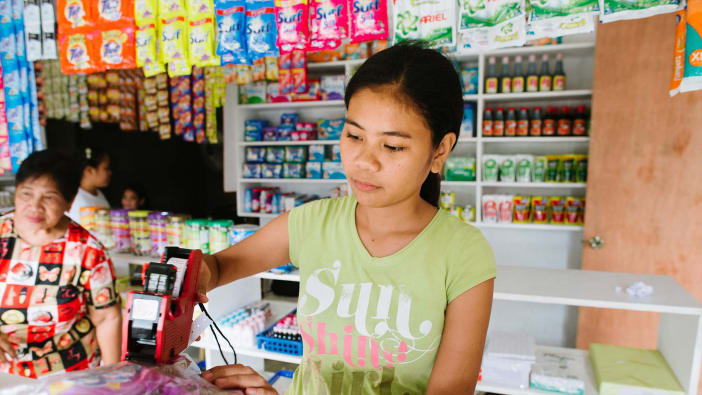
Articles
Globalisation and family life: A grassroots perspective
Tearfund has recently carried out some research into the positive and negative impacts of globalisation on developing countries
2003 Available in English, French, Spanish and Portuguese

From: Families under pressure – Footsteps 55
Practical ideas for supporting strong and healthy families

Photo: Jim Loring/Tearfund
Tearfund has recently carried out some research into the positive and negative impacts of globalisation on developing countries. Questionnaires were sent out to Tearfund partner organisations all over the world. One of the issues raised in the questionnaire was the impact that globalisation is having on family life.
- Some respondents said that globalisation is not affecting their family life. Most, however, said that globalisation is having an impact, mainly through television and technology.
Television lessens the amount of time that families spend together. It also exposes children to new value systems, makes them grow up faster and gives them a thirst for consumer goods.
Other technology is having a more positive impact. The internet and telecommunications are helping to connect families living in different places and allows fast communication.
However, both television and technology are leading to materialism. They create a growing desire for luxuries:
We are exposed to products that certainly make life easier, but sometimes we are not able to afford them. There is tension in the family when there is a mismatch between what members want and what we can afford. (Asia)
- Family lifestyles have changed. Family ties are breaking down and the traditional extended family system is gradually being replaced by families consisting only of parents and children.
There is pressure for more work and less time to see each other and be together as a family… We are placing our children into other people’s care because both parents have to work. (Latin America)
Child discipline, which should belong to everybody in society, now belongs only to parents. (English-speaking Africa)
- Other respondents were less negative about globalisation – they have seen their family’s health improving, and they like the fact that their children are global citizens and are able to appreciate different cultures.
Parents spend better time with their children. They listen to them and very often decide things with them. (French-speaking Africa)
Compiled by Fiona Wilson, Research Assistant to the General Director, Tearfund.
Similarly Tagged Content
Share this resource
If you found this resource useful, please share it with others so they can benefit too.

Subscribe to Footsteps magazine
A free digital and print magazine for community development workers. Covering a diverse range of topics, it is published three times a year.
Sign up now - Subscribe to Footsteps magazine





